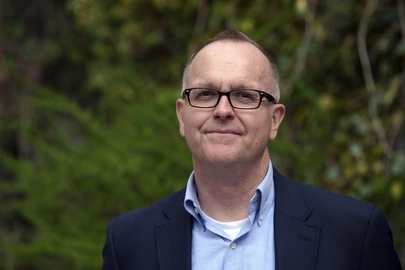Viewpoint: Interview with Christian Borgemeister, new ZEF-Director
December 03, 2013.
Bonn, October 2013. Professor Christian Borgemeister has been the new Director of ZEF's Department of Ecology and Natural Resources Management as of October 2013. He is an agricultural engineer by training and specialized in entomology. Before he was director of the International Centre of Insect Physiology and Ecology (ICIPE) at its headquarter in Nairobi, Kenya, from 2005 onwards.
Dear Mr. Borgemeister, what brings you to an interdisciplinary institute working on development issues in Bonn?
Well, I am leaving an international, development oriented, interdisciplinary research center in Kenya to join a like-minded center in Bonn. Thematically speaking, I don’t think that there are such massive differences between ICIPE and ZEF. We thrive to conduct interdisciplinary research and especially over the last three, four years we ventured quite significantly into social science. ICIPE was traditionally a natural science-dominated center. But for various reasons, among others the need to be far more active in terms of cost-benefit-analysis and impact assessment studies we have embraced a lot more social science and that brought in a disciplinary brick to ICIPE that we hadn’t had in the past. So, in terms of the interdisciplinary nature of the two centers, icipe and ZEF, I think we are on the same line.
What are your personal “lessons learnt” out of interdisciplinary research experience?
It sounds easy, it is very difficult. Many people claim to do it, few actually do it. If you really want to do it in an intelligent, impact-generating manner, it’s a lot more difficult than you think in the first place. There are language barriers, differences in approaches in science. Where I come from, a quantitative approach is the religion. This I learnt from my day one in science. Discussing with colleagues who have a more qualitative approach to research is challenging, sometimes interesting, sometimes super frustrating. But I think, if you do it right, the rewards are quite significant. It is really worth the effort, especially if you want to translate your research findings into something meaningful for your target beneficiaries. And that is what we are asked to do in our field of research.
ZEF’s research even aims to be “trans-disciplinary” in making research findings relevant for development processes. Do you have experience with bridging the gap between research and practice?
I think so. The push-and-pull-technology of ICIPE is probably one of the best-known technologies we developed. There are around 65,000 farmers in the Lake Victoria region who are practicing this intercropping system, and icipe is adding on average 15 to 20,000 farmers a year.
Another example: ICIPE is one of the few institutes that deals with etymologies, the science of insect diseases in Africa. We collected a lot of data and did scientifically speaking a lot of meaningful things. However, we never translated this into something tangible for growers. Four years ago, we established a very fruitful business relationship with a private, Africa-based pesticide produce that has taken up some of the inventions of ICIPE and turned them into products.
In 2011 you received the international “Plant Protection Award of Distinction” for your work on the role of plant protection strategies in promoting global food security. Why did you choose this specific research angle?
If been working for the last 25 years on means to reduce losses that are caused by insect pests primarily in crops – therewith contributing to research on food security. Thirty-five percent of storage of cereals in Africa is lost, for example. If this third could be preserved, and I am only talking about post-harvest losses, that would be a phenomenal contribution in terms of food security at absolutely zero environmental costs.
If you follow the discussion about the seven billion that are coming and the need to boost food production, it is very often a productivity-based argument. I believe that an intelligent approach to preserving what is already growing in the field and what is already kept in the store is a very environmentally-friendly contribution to food security.
You have been working as a director of an international research institute in Kenya for the past eight years. So what do you consider the main challenges and constraints for academic research and higher education in the African countries you worked in and with?
What do you consider the main challenges in higher education in the African countries you worked in?
Gender issuses. Too few girls pick up natural sciences. This is something that has to start very early. Girls have to be encouraged in primary school level to engage in natural science, especially in Africa. Another issue is that the quality of university education in Africa is very heterogeneous. There are a couple of universities that have improved a lot, like Makarera in Uganda. We need more Makareras, more flagship universities in sub-Sahara. There has to be a paradigm shift, away from the pure teaching to research. Some simple measures can be taken by the vice-chancellors of the universities, rewarding the science lecturers that are interested in research. There are some examples, like universities in Rwanda and Ethiopia, which are remodeling their education system. More countries need to follow soon.
What is your top priority list for issues to be dealt with at ZEF?
Food security and loss prevention, which I mentioned before, and the inter-linkages between agriculture and health are among the topics I would like to pursue at ZEF. Agriculture production systems influence the health status of people, predominately in the tropics. There are significant parts of Africa that are getting drier, at the same time you have a phenomenal increase in population and food demand. Changes to agricultural landscape architectures can have an impact, for example by irrigation. Only three percent of the agriculture area in sub-Saharan Africa is irrigated. However, irrigation-agriculture can have a tremendous effect on diseases, especially in Africa. So you can have a boost of productivity, and at the same time a very sick population. Doing it right would assure that you obtain the boost, but don’t risk the health of the farming population. It’s a technical problem.
The interview was conducted by Alma van der Veen.You can watch the interview on ZEF's <link https: www.youtube.com external-link-new-window external link in new>youtube channel or read it in <link fileadmin webfiles downloads zefnews zef_news_28_en.pdf download file>ZEF news no. 28 (page 10). You can also watch the inaugural lecture of Professor Borgemeister, "Little enemies - unhealthy outcomes" held on January 21, 2014, on ZEF's <link https: www.youtube.com external-link-new-window external link in new>youtube channel.



